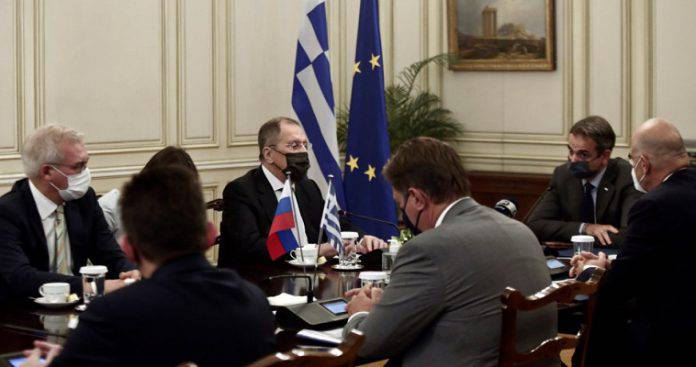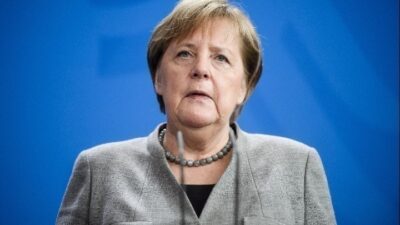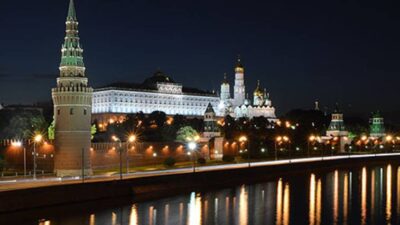Stavros Lygeros: Lavrov visit: What can Greece expect from Russia?
28/10/2020
When on November 6, 2019, a few months after taking over the Foreign Ministry portfolio, Dendias visited Russia, his aim was to bridge the rift caused by his predecessor Kotzias in Greek-Russian relations on the occasion of the Prespa Agreement. Indeed, the prevailing ice had broken then, but neither Moscow nor Athens then made moves to reheat the climate.
Almost a year has passed since Dendia’s visit and a lot has changed since then. The constant and intensifying frictions in Russian-Turkish relations prompted the Kremlin to reconsider and attempt a rapprochement with Athens. That was the purpose of Lavrov’s visit. From the information that has been leaked, the talks of the Russian Foreign Minister with both his Greek counterpart and PM Mitsotakis hold no surprises. Each side said what it was expected to say.
Moscow has said it is prepared to mediate, if Athens and Ankara so wish, to de-escalate tensions. The objective margins for such a thing, however, are negligible. The Greek side is open to any relevant initiative, but Erdogan has a policy, which can be summarized as follows: either there will be negotiation on all issues of the Turkish expansionist claims, or today Oruc Reis and tomorrow a Turkish drilling rig will increasingly create faits accomplis in the potential Greek EEZ.
Moscow knows exactly what is happening in the Cypriot EEZ and on the Greek-Turkish front, but it is certainly not going to speak the language of international law. As a great power, it adopts a policy that serves its interests. In this case, it means that there was a case to condemn Turkey’s stance. On the other hand, however, he explicitly recognized Greece’s right to extend its territorial waters to 12 miles, even if Lavrov “watered down” the Russian position somewhat.
We must note that the Greek-Russian rift had been caused in 2018 when, by Kotzias’ decision, two Russian diplomats had been deported and two others had been banned from entering Greece. Russian Foreign Ministry spokeswoman Zakharova had said that the deportations were US-led. Although then PM Tsipras and defense minister Kammenos were looking for a way to drop the tone, Kotzias had caused a sharp confrontation with Zakharova, as a result of which the trauma deepened and the bilateral relations were frozen for a long time. Lavrov’s scheduled visit, as a result, was put on ice.
The unbalanced balance
It is a dogma of Greek foreign policy throughout the post-junta period that Athens maintains a heterogeneous balance in its relations with the West on the one hand, and with Russia on the other. This is the reason why in 2006 the European Council on Foreign Relations presented Greece and Cyprus, due to Orthodoxy, as the Trojan horses of Russia in the West!
This unbalanced balance was upset by Kotzias. Even Dendia’s trip to Moscow a year ago did not bridge the gap, although – as I mentioned above – he broke the ice. And it did not bridge it, because the Mitsotakis government showed from the beginning its intention to put all the eggs in the American basket. This at least emerged from the Greek-American military agreement, with which Greece gave the Americans what they asked for, without receiving the slightest consideration.
It is a fact that Greece has been tied to the American chariot in a way that has no precedent in the post-junta period. The overthrow of the traditional heterogeneous balance that took place during the SYRIZA government also contributed to this. The turning point was the Tsipras-Kotzia’s visit to Washington in October 2017.
Since then, a negative atmosphere had begun to form in Greek-Russian relations. Seven months before the deportations (summer 2018), Athens had not approved the credentials of a Russian intelligence official, who had been sent as a diplomat to the Russian embassy here. At the time, the Russian side had retaliated by doing the same to a Greek diplomat who had been transferred to the Greek embassy in Moscow. Although then the case had remained in the dark so as not to poison bilateral relations, it was an unmistakable sign of the downhill turn they had already taken.
Message to Ankara
The reversal of the unbalanced balance turned into a chronic situation and during the Mitsotakis government, it was consolidated, even if the climate in bilateral relations improved. Lavrov’s visit was pending, but it happened now, because it also served Moscow’s intention to send a message to Ankara.
Putin may want Turkey as far away from the West as possible, and Erdogan may need Russia to balance the pressure to return to the “western fold,” but Russian-Turkish relations are not just useless. The interests of the two countries are conflicting on all local fronts, in Syria, Libya, and now in the Caucasus.
The need for each other on the big chessboard pushed Moscow and Ankara to find compromises in both Syria and Libya (especially after the bombing of the Al Watiya base). In the Armenian-Azerbaijani war, however, things are more difficult. Russia will not allow Turkey to gain a dominant role in its “backyard” through Azerbaijan.
Lavrov’s visit is a partial balancing act
Lavrov’s visit to Athens now is not unrelated to Russian-Turkish frictions. By opening up to Greece, the Kremlin wants to somewhat balance the Russian-Turkish approach of recent years. An approach that had recently led Moscow to take a miserable stance on the issue of turning Hagia Sophia into a mosque.
For years, Russia has been trying to gain a foothold and influence in Greece, using Orthodoxy as a vehicle. Orthodoxy, after all, is a central component of Russian national ideology, and therefore Russians traditionally view Greece and Cyprus with particular interest, in which, due to their traditional stance on the Cyprus issue, they have gained a foothold.
Russia’s stance on the issue of Hagia Sophia has caused deep frustration in pro-Russian circles in Greece. That is where the Russian factor has been privileged for the last 30 years. Possibly, Lavrov’s visit, as well as the statement that Russia recognizes Greece’s right to extend its territorial waters to 12 miles, constitute a kind of corrective move.
Russian losses in the Balkans
Russia has won the battle for influence in Syria and partly in Libya, but has lost a lot of ground in the Balkans. Moscow’s displeasure over this, in fact, had been expressed through Lavrov. The last link in the chain was the loss of North Macedonia, which joined NATO. Moscow’s only geopolitical base in the region is Serbia, and this in part, as Vucic’s visit to the United States has shown. But even if we consider that Serbia maintains a privileged relationship with Russia, it is in fact surrounded by NATO member states and it is known that its prospect of joining the western chariot is being manipulated.
The Russian losses in the Balkans are an additional reason why Moscow seeks to restore the heterogeneous balance that Greece has maintained for decades (with the inevitable fluctuations) vis-a-vis the West and Russia. Lavrov’s visit is therefore part of this. The atmosphere in the talks he had in Athens was very good, but the practical results will be seen in the near future.
Athens needs Moscow as another pole of support on the many open fronts with its neighbor. Especially today, when Ankara-Washington relations have been severely disrupted and Erdogan does not seem to understand US pressure and threats. The Mitsotakis government believes that Putin is the only one who can intervene effectively with Erdogan and considers this a very important additional reason to have good relations and an open channel with the Kremlin. For this reason, last year the joint Greek-Russian Consultation Program 2020-2022 was signed, with which regular contacts were established at an official and political level.





